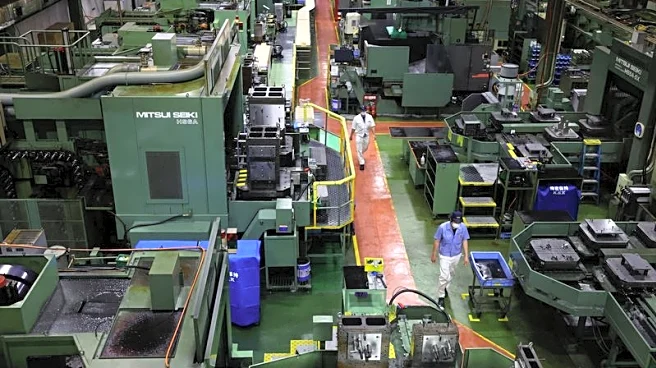By Kantaro Komiya
TOKYO (Reuters) -Japanese manufacturers' sentiment was its best in more than three years in September, the Reuters Tankan poll showed, with trade uncertainties easing after Japan reached
a tariff deal with the U.S. in July.
The monthly poll tracking the Bank of Japan's quarterly business survey showed the manufacturers' mood index improved to 13 in September from 9 in August, marking a third month of increases and the highest reading since August 2022.
Manufacturers expect sentiment to dip slightly to +11 by December, according to the survey of 497 major non-financial companies, of which 238 responded on condition of anonymity between August 27 and September 5.
Six of nine manufacturing industries surveyed saw their sub-indexes improving in August, including the auto and transport machinery industry, which had its index jumping to 33, the highest since December 2023, from 25.
Multiple managers in the transport machinery sector said they were receiving solid orders, while some referred to stagnant domestic production in recent months given a shrinkage in exports.
U.S. President Donald Trump last week signed an executive order formalising the trade agreement with Japan, removing some worries in Tokyo about the implementation of the reduced tariff rate of 15% on key Japanese export items such as cars.
Some other industry managers expressed mixed views, saying customer demand and investment were lukewarm except for relatively bright spots such as semiconductor businesses.
Textiles, oil refinery and precision machinery sectors had their confidence dipping in August. "Orders have been sluggish due partly to Trump's tariffs," one precision machinery maker manager said.
Looking ahead, manufacturers were less optimistic, also because of a feeble domestic economy, with respondents citing the effects of persistent inflation on consumer spending and rising material and labour costs.
The service-sector index rebounded to 27 in September, after hitting a nine-month low of 24 in August, the poll showed. Non-manufacturing firms saw no change in their outlook in December at 27.
Four of six service industries, including real estate, retail and transport, had their sub-indexes up, while wholesalers and IT firms reported dimmer business conditions in August.
Despite global trade tensions, Japan's economy has been buoyed by relatively resilient consumption at home. The world's fourth-largest economy expanded by an annualised 2.2% in April-June, a revised gross domestic product data showed on Monday.
(Reporting by Kantaro Komiya;Editing by Helen Popper)









